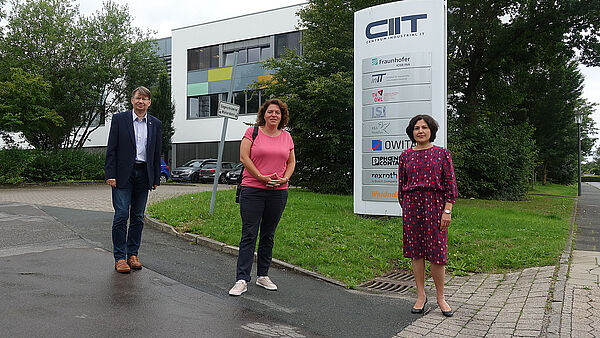Mathematics could make an important contribution to animal welfare-oriented agriculture in the future: Professor Dr. Helene Dörksen from the Institute for Industrial Information Technology (inIT) at the Ostwestfalen-Lippe University of Applied Sciences presented her new method for sex recognition in bird eggs to Kerstin Vieregge, a CDU member of parliament from Lippe. "It is absolutely exciting to see how interdisciplinary thinking and approaches beyond one's own nose are used here to do research for practical applications," Vieregge was impressed after the talk on the Lemgo campus. The member of the Bundestag will now promote the approach of TH OWL in Berlin.
Dörksen and her team are using "fluorescence spectroscopy" to identify the sex of birds' eggs. This involves sending light into the egg through a minimally invasive procedure and then mathematically evaluating it based on the image data obtained. "With a hit rate of up to 93 percent," Dörksen emphasizes, not without pride. Her area of expertise is the evaluation of the data sets, which are analyzed using specific logarithms. She and her team spent one and a half years researching in order to find the right time for detection, especially with a view to animal welfare: "With the test on the sixth day of incubation, we are directly ahead of pain sensitivity, which begins on the seventh day," she explains, thus also clearly referring to the ethical responsibility of science.
The goal of the project is ambitious: "We want to refine and at the same time simplify the method in such a way that it can be used as a transportable measuring device also for small hatcheries and individual farmers." To achieve this, however, there are still a few steps to be taken; in cooperation with a large company in the industry, practical tests are to provide further insights in order to be able to offer an optimized procedure in the end. After that, the project would be completed for TH OWL for the time being; others will have to organize the market-ready implementation.
"When it comes to the transition from research to industrial or, in this case, agricultural application, we have to develop different structures in Germany," notes the member of the Bundestag. "While elsewhere consortia between industry and universities are a matter of course or the state provides bridging loans, in Germany we too often let successful research go to waste," she finds. This is a problem that she has already addressed directly with the Minister of Food and Agriculture, Julia Klöckner, during her visit to Lippe in relation to the TH OWL project.
"But for now I am pleased that from Lippe once again comes a promising approach that can bring our animal welfare-oriented agriculture forward," says Kerstin Vieregge. "This is what I will be campaigning for in Berlin, because it is good for people and animals alike."


